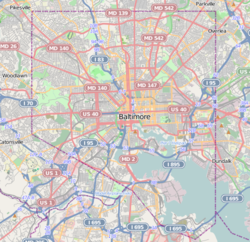McElderry Park | |
|---|---|
 Amazing Grace Evangelical Lutheran Church, 2424 McElderry Street | |
| Coordinates: 39°17′50″N 76°34′53″W / 39.297211°N 76.581316°W | |
| Country | United States |
| State | Maryland |
| City | Baltimore |
| Area | |
| • Total | .161 sq mi (0.42 km2) |
| • Land | .161 sq mi (0.42 km2) |
| [1] | |
| Population (2008)[1] | |
| • Total | 4,477 |
| • Density | 28,000/sq mi (11,000/km2) |
| Time zone | UTC-5 (Eastern) |
| • Summer (DST) | UTC-4 (EDT) |
| ZIP code | 21224 and 21205 |
| Area code | 410, 443, and 667 |
McElderry Park is a neighborhood in the northern part of the southeastern district of the City of Baltimore. Its boundaries are marked by East Fayette Street, East Monument Street, Linwood Avenue, and Patterson Park Avenue. South of McElderry Park is the neighborhood of Patterson Park; Butchers Hill is to the southwest. Ellwood Park is located to the east, and the campus of The Johns Hopkins Hospital to the west. To its north is the neighborhood of Madison-East End.[1]
In the early 1980s, McElderry Park suffered from white flight and abandonment by its working class homeowners. The closing of nearby public housing flooded the neighborhood with Section 8 tenants in individual rowhouses and apartments, with additional street crime, and illegal drug trade. Throughout the 1990s, the area became the most crime-ridden in old East Baltimore. Efforts are underway to turn things around, replacing abandoned buildings with productive uses such as public gardens.
The 2000 census reported that 34.3 percent of McElderry Park's families had incomes below the poverty line. Although predominantly black, the neighborhood has significant white and Hispanic populations.[1]
- ^ a b c d "Mcelderry Park neighborhood" City-Data.com. Retrieved 2010-10-06.
